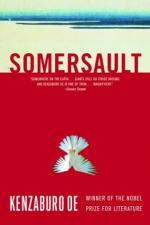|
This section contains 10,043 words (approx. 34 pages at 300 words per page) |

|
SOURCE: Tachibana, Reiko. “Structures of Power: Ōe Kenzaburō's ‘Shiiku’ (‘Prize Stock’).” World Literature Today 76, no. 2 (spring 2002): 37-48.
In the following essay, Tachibana analyzes thematic aspects of Ōe's “Prize Stock,” perceiving the story to be a study of power in a Japanese village community.
The literary talents of Ōe Kenzaburō, winner of the 1994 Nobel Prize in Literature, were recognized in Japan in 1958, when his short story “Shiiku” (Eng. “The Catch” or “Prize Stock”)1 won the prestigious Akutagawa Prize.2 Ōe, age twenty-three, was then a student at Tokyo University. Drawing in part on childhood memories—memories he acknowledges were preserved as “not factual but mental” (Kaku no taika to “ningen” no koe, 100)—“Shiiku” is set in a remote village in a valley, rather like Ōe's hometown on the island of Shikoku, and its main character is a boy who has a younger brother, as Ōe did.3
As a child...
|
This section contains 10,043 words (approx. 34 pages at 300 words per page) |

|


